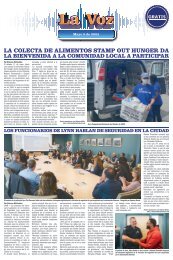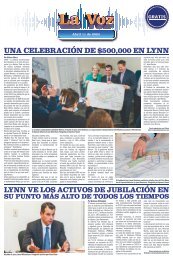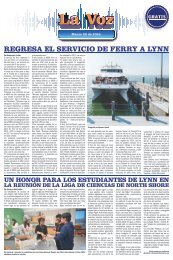You also want an ePaper? Increase the reach of your titles
YUMPU automatically turns print PDFs into web optimized ePapers that Google loves.
6
WEEKLYNEWS.NET - 978-532-5880 MARCH 19, 2020
Five tips to focus on de-stressing
By Kristen Reed
Here are five must-try tips
for de-stressing in a time when
stress has been heightened.
After a long day at work we
may feel exhausted, on-edge,
and frazzled.
If this is the case, it’s crucial that
we focus on de-stressing so that
we can be present for ourselves
and our family, for our health and
wellbeing and to optimize sleep.
You deserve to feel good after putting
in the hard work at the office
or home with the kids.
Remember to breathe:
Practice deep breathing to
help center yourself by inhaling
relaxation and peace
and exhaling stress, tension
and overwhelm. Try to commit
to five deep cleansing breaths
in through your nose and out
through your mouth.
I like Dr. Weil’s “4-7-8” technique,
which entails breathing
in to a count of four, holding for
seven seconds, then exhaling
for eight counts. You’ll stimulate
your parasympathetic nervous
system and instantly feel
more relaxed, with decreased
heart rate, blood pressure and
muscle tension.
Practicing intention:
Set an intention before you
walk into your house. By set-
COURTESY PHOTO
Kristen Reed is a Lynnfield resident and Registered Nurse featured on the front page of the
Brigham and Women’s heart and science publication for her initiative creating nursing staff
Wellness Days and a Reiki Resiliency research project for both nurses and patients.
ting an intention we decide to
shift our mindset and think and
act accordingly. How do you
want to feel? What can you do
to get there? Think of an intention
that is positive, simple,
achievable and one that you believe
strongly in, and go with it.
Some examples are: I see the
good in each situation, I am
present for my children, I am
relaxed and grateful for my life,
I am rejuvenated by spending
time with my spouse.
Prioritizing priorities:
It’s important to identify your
priorities and focus on what
means the most to you. This may
be practicing some self care, sitting
down with your children to
talk about their day at school or
connecting with your husband
or wife over dinner. Be intentional
by focusing on what matters
most.
Take a screen break:
Chances are high that
you’re looking at a computer
screen or cell phone frequently
throughout the day. Take a
break from the screens and let
your mind and eyes rest.
Studies show that the blue
light emitted from these devices
can disrupt sleep and cause daytime
tiredness, so this is a prime
opportunity to start downshifting
the devices.
Move your body:
Find a way to move your body
in some way to get the feelgood
happiness and pleasure
hormone, Dopamine, flowing.
Not only will some form of exercise
decrease your stress from
the day at work, it also protects
you from long term stress.
I know what you’re probably
thinking, “I have no time” or
“I’m too tired.” I totally get it,
but commit to something that
seems doable, even for just 1
minute. Try 30 jumping jacks,
or 20 squats, 20 pushups and 20
crunches, a one minute plank,
or dance to your favorite music
(plus you can recruit your kids,
too.) Any little bit helps.
Legal strategies for unsettling times
By Patrick Curley
The coronavirus threat has
caused tremendous anxiety for
seniors and their loved ones.
In the last few weeks, media
pundits have recommended
countless “to do” lists on how
to prepare. Unfortunately, one
vital planning strategy is rarely
included on those “to do” lists.
That strategy is to get your legal
affairs in order.
It is especially important for
seniors to create a roadmap
for “what if” scenarios in the
future, whether that may be
Coronavirus or any other unexpected
event.
If you cannot make your
own healthcare decisions and
you have not done your legal
planning, or the planning you
have is outdated or inadequate,
your loved ones will be
forced to pursue a probate court
guardianship.
Waiting for the court to act,
however, could impact your
access to medical treatment
or even your right to participate
in available drug trials.
Any unusual health decisions
would require special court
oversight and any objecting
family member can grind the
process to a halt. Moreover,
going to court will be expensive
and stressful for your
loved ones – why put them
through that?
Instead, sign a Health Care
Proxy while you are well.
Also, sign a Health Information
Protection Act Authorization
and Release so your decision
makers have ready access
to your medical records and
information.
Consider signing a Living
Will to clarify your end-of-life
decision making wishes. This
can protect you against family
members who want to overrule
the Health Care Proxy because
they think they understand your
wishes better.
We set clients up with an
emergency medical identification
card to carry in their wallet
or purse. First responders and
medical institutions can easily
access their healthcare directives
through the card any time
of day, anywhere in the world.
This ensures that in an emergency,
your appointed agent
– not a stranger – is the person
calling the shots on your behalf.
You also have to plan ahead
for the management of your
financial affairs. No one will
have authority to pay your bills,
access your IRA or 401(k), or
deal with your real estate unless
you give them clear authority
to do so in a Durable Power of
Attorney (POA).
Beware that most POAs fail
to include all the necessary
authority to shield and protect
your nest egg if you require
long-term care, or to minimize
estate taxes if you have a taxable
estate. To get your POA
done right, be sure that your
attorney deals regularly with
asset protection planning and/or
estate tax planning.
If you have no POA or your
POA is inadequate, your loved
ones will be forced to pursue a
costly, stressful Probate Court
conservatorship.
This is also an opportunity
for you to check the beneficiaries
on your life insurance,
annuities, and other financial
accounts and assets, as those
beneficiaries may not reflect
your current wishes. Note
that your Will or other estate
planning documents will not
override your beneficiary designations
on these financial
products.
Everyone should have a will
so that upon your death, you –
not the Commonwealth – determine
where your assets pass.
For many families, a trust may
offer additional planning opportunities
and protections.
Several local colleges have
closed campuses, many concerts
and large gatherings have
been cancelled, and “social
distancing” is becoming the
new norm. For those who are
anxious about visiting an attorney’s
office, a good attorney
should be able to help you do
much of the planning through
telephone or video conferences
on your mobile phone.
Even an estate plan signing
can be conducted with strategic
preparations to minimize
risks. By way of
example, our office implemented
a detailed COVID-19
prevention and response
plan, which we update based
upon ongoing CDC and other
expert guidance.
While estate planning may
not prevent a healthcare crisis,
it can and will ensure that you
control who makes decisions. It
also prevents your loved ones
being left with an expensive,
stressful mess to fix in a tight
timeframe. Getting your legal
affairs in order today will give
you the peace of mind that you
have taken a tangible step to
truly be prepared for an uncertain
future.
Attorney Patrick G. Curley
of Wakefield has volunteered
on the board of directors
of the MA Chapter of the
National Academy of Elder
Law Attorneys (MassNAELA)
since 2009. He practices Estate
Planning, Elder Law, and Asset
Protection at Curley Law Firm
LLP at 1 Common Street in
Wakefield.

















